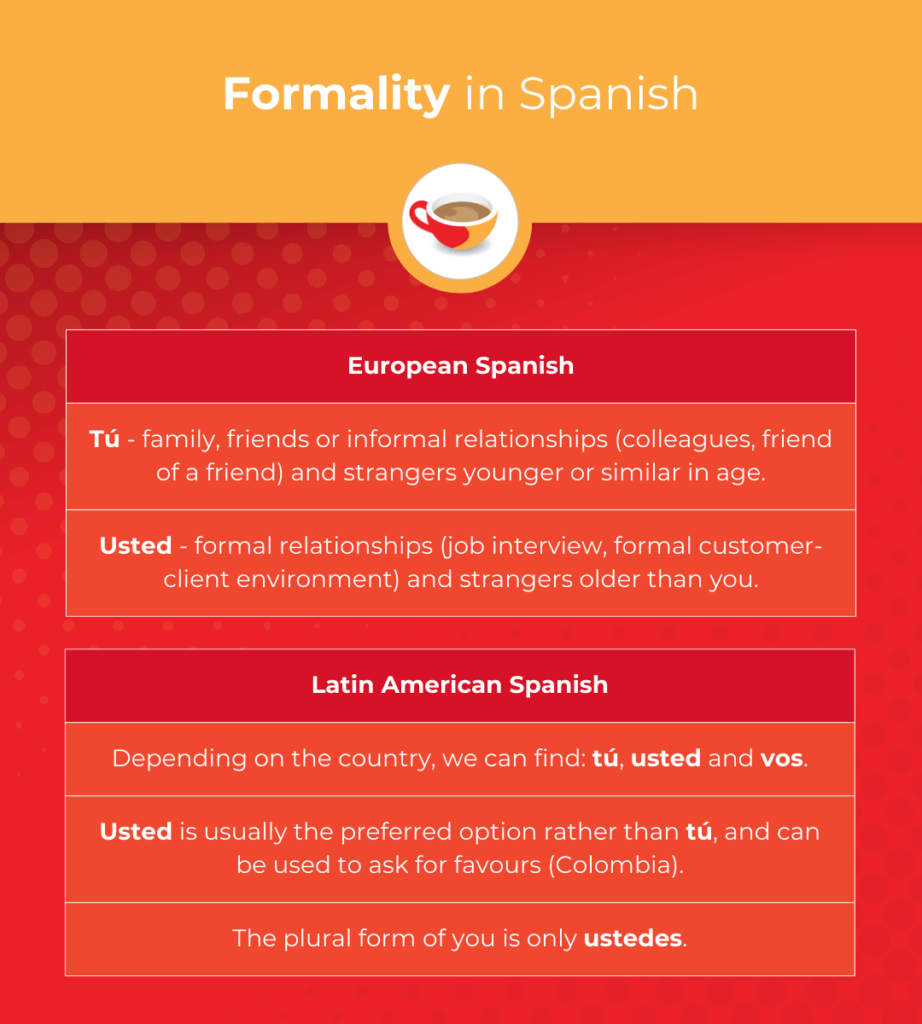Knowing when to use tú and when to use usted can be challenging for any learner of Spanish, especially because it depends on the location where you are speaking Spanish.
The Coffee Break Spanish Show is a podcast series of bite-sized, friendly conversations, in which we demystify tricky Spanish language topics. In the latest episode, Anabel and Concha look into how to use tú and usted like native speakers in Spanish and sound natural in any part of the Spanish-speaking world.
Continue reading to find out more and why not listen to the podcast as you go?
Should I say ‘tú’ or ‘usted’?
In European Spanish, in general, we use both tú and usted, and there are actually verbs to describe both of these actions:
tutear
to use the tú form with
ustedear
to use the usted form with
The use of one or the other will be determined by the context and how formal or informal the situation is. For example, we use tú when talking to people close to our age and with friends and family. We use usted when talking to strangers, especially if they are older than us, in order to show respect.
However, the lines aren’t always clear, so don’t worry! Here are some key points to remember:
- Use tú with your colleagues and maybe managers if the relationship is informal.
- With strangers, use tú with people younger or around your age.
- In customer service we can find both tú and usted. Tú is used when the brand looks for a more relaxed and friendly tone with their customers and usted if they prefer to show professionalism. Both are correct and it depends mainly on the company ethos.
- As for the plural forms, to address more than one person, we use vosotros/as in all the situations where you would use tú with an individual, and we use ustedes in the situations where you would use usted with an individual.
What about in Latin America?
In Latin American Spanish, the diversity in usage is greater and it will depend on the country.
In some countries, the use of vos instead of tú is the preferred option, while in other countries Spanish speakers prefer usted over tú.
One thing all Latin American countries have in common is that the plural form tends to always be ustedes, and not vosotros/as in informal contexts.
Another specific usage to note is that in Colombia, we can use usted to ask for a favour or to talk dearly to someone:
Anabel, ¿puede llevarme a la estación de tren en coche, por favor?
Anabel, can you take me to the train station by car, please?
Another regional difference
If you have enjoyed learning about the local differences and uses of tú, usted and vos, you may like this!
In the west of Andalucía, Concha says in the episode that she uses ustedes instead of vosotros, but using the vosotros conjugation of verbs. This means that Concha would naturally say ustedes tenéis for “you have”. Qué interesante, ¿verdad?
Keep practising ‘tuteando’ and ‘ustedeando’

One important thing to keep in mind is that we don’t need to stress too much about all these differences. Native speakers will be able to understand what you mean! However, it’s always nice to learn about the cultural differences and the diversity we can find in the Spanish language.
If you found this post interesting, make sure to listen to the full episode with Concha and Anabel on The Coffee Break Spanish Show. This is the series in which we look at a range of topics for Spanish learners, so make sure to subscribe to our podcast feed and our channel on YouTube.
Plus! To get regular free Spanish lessons in your inbox, you can sign up for our short (coffee-break-sized) email lessons that will help you improve your Spanish. You will also hear from Mark, the founder of Coffee Break Languages, giving advice for language learners at any level. Sign up below!
Remember to keep practising using tú and usted when you are in a Spanish-speaking country, and listen out to hear how others do so. This is something you will get the hang of little by little and we’re sure that it will start to feel more instinctive in no time.
Happy Coffee Breaking



